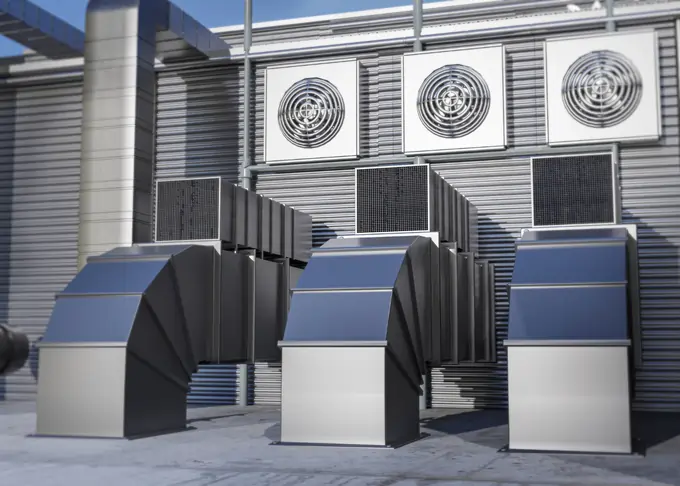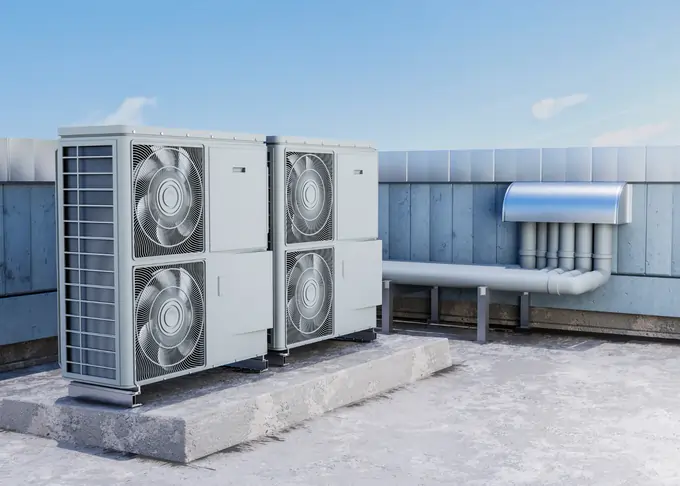Are you tired of sweltering summers and sky-high energy bills?
Energy efficient air conditioners might be the solution you’ve been looking for.
But with so many options on the market, how do you choose the right one?
In this comprehensive guide, we’ll explore everything you need to know about energy efficient air conditioners.
From understanding the basics to selecting the perfect model for your home, we’ve got you covered.
Ready to cool down and save money?
Let’s dive in!
What Are Energy Efficient Air Conditioners and How Do They Work?
Understanding the Basics of an Air Conditioner
Air conditioners remove heat and humidity from the air in your home.
They use refrigerant to absorb heat and transfer it outside.
The process involves four main components: evaporator, compressor, condenser, and expansion valve.
Energy efficient models optimize this process to use less energy.
Key Features of Energy Star® Certified Air Conditioners
Energy Star certification ensures a product meets strict efficiency guidelines set by the U.S. Department of Energy.
These units use 15% less energy than standard models.
Features often include variable-speed compressors and improved coil designs.
Look for the Energy Star label when shopping for a new air conditioner.
How Energy Efficiency Impacts Your Home’s Comfort
Efficient cooling means more consistent temperatures throughout your home.
Better humidity control creates a more comfortable environment.
Lower energy usage translates to reduced utility bills and a smaller carbon footprint.
Improved air quality can lead to better health for you and your family.
How Do I Choose the Right Central Air Conditioner for My Home?

Determining the Proper Air Conditioner Size for Optimal Performance
Sizing is crucial for efficiency and comfort.
An oversized unit will cycle on and off frequently, wasting energy.
Undersized units struggle to cool effectively on hot days.
Consider factors like room size, insulation, and local climate.
The Importance of BTU Ratings and What They Mean
BTU (British Thermal Unit) measures cooling capacity.
One BTU is the amount of energy needed to cool one pound of water by one degree Fahrenheit.
Higher BTU ratings indicate more powerful cooling.
For example, a 6,000 BTU window AC unit can cool rooms up to 250 square feet.
Considering Seasonal Energy Efficiency Ratio (SEER) for Long-Term Savings
SEER ratings indicate an air conditioner’s efficiency over an entire cooling season.
Higher SEER ratings mean greater efficiency and lower energy costs.
The minimum SEER rating for new central air conditioners is 13 in the northern U.S. and 14 in the southern U.S.
Energy Star certified models have SEER ratings of 15 or higher.
Are Energy-Efficient Air Conditioners Really Worth the Investment?
How Energy Efficient Air Conditioners Provide Energy Savings
Energy efficient models use advanced technology to reduce power consumption.
They can save up to 20-30% on cooling costs compared to older units.
The initial investment is often offset by long-term energy savings.
Many utility companies offer rebates for installing energy efficient air conditioners.
The Role of Inverter Technology in Efficiency
Inverter technology allows the compressor to run at variable speeds.
This results in more precise temperature control and less energy waste.
Inverter air conditioners can be up to 30% more efficient than traditional models.
They also tend to have a longer lifespan due to reduced wear and tear.
Potential Energy Savings May Vary: What You Need to Know
Actual savings depend on factors like climate, home size, and usage patterns.
Proper installation and maintenance are crucial for achieving maximum efficiency.
Energy Star estimates that replacing a 10-year-old air conditioner can save $115 per year on cooling costs.
Consider your specific situation when evaluating potential savings.
What Are the Different Types of Air Conditioners Available?

There are loads of different types of air conditioners out there! You’ve got your classic window air conditioner, which is perfect if your home already has an available window slot. Then, there are btu portable units—think around 6k btu for smaller rooms.
Considering air conditioner efficiency? Make sure to choose the right size. Smaller units for bedrooms and bigger ones for living rooms, got it? Never forget: all air conditioners use energy, but the right size saves you more in the long run!
That cool air back on a hot day is just unbeatable, right? 😎
Comparing Central Air Conditioners to Room Air Conditioners
Central air systems cool the entire home through a duct system.
Room air conditioners, like window units, cool individual spaces.
Central air is more efficient for whole-house cooling but requires professional installation.
Room air conditioners are cheaper upfront but less efficient for large spaces.
The Pros and Cons of Portable Air Conditioners
Portable ACs offer flexibility and don’t require permanent installation.
They’re ideal for renters or those who move frequently.
However, they’re generally less efficient than window units or central air.
Portable units often have lower BTU ratings and higher energy costs.
Window vs Through-the-Wall Air Conditioning Units
Window units are the most common type of room air conditioner.
Through-the-wall units are similar but installed permanently in an exterior wall.
Window ACs are easier to install and remove but can block natural light.
Through-the-wall units don’t obstruct windows but require professional installation.
How Can Efficient Cooling Improve Indoor Air Quality?
Hey there! Want better air indoors? Well, turns out that a good window air conditioner can make a big difference. When air conditioners use the right tech, they can really clear the air. It’s all about air conditioner efficiency; it needs to move the air back around your home already.
If you get a btu portable unit that’s a good fit, like a cozy 6k btu model, it’ll be a game-changer. Just make sure to choose the right size for your space, and you’re golden!
Understanding Humidity Control with Your Air Conditioner

Air conditioners naturally remove humidity as they cool the air.
Efficient models often have better dehumidification capabilities.
Proper humidity control prevents mold growth and improves comfort.
Look for units with specific humidity settings for optimal control.
The Role of a Dehumidifier in Your Cooling System
Some air conditioners come with built-in dehumidifiers.
Standalone dehumidifiers can supplement your AC in very humid climates.
Combining AC and dehumidification can improve efficiency and comfort.
Consider a whole-house dehumidifier for large homes or very humid areas.
Ensuring Proper Insulation for Better Air Quality
Good insulation helps your AC work more efficiently.
It prevents hot air from entering and cool air from escaping.
Proper insulation can reduce your cooling needs by up to 30%.
Check for air leaks around windows and doors to maximize efficiency.
What Are the Best Air Conditioner Models for Energy Efficiency?
Looking to keep your home cool in 2023 while saving some energy and money? Check out the best air conditioner models for energy efficiency. If you’re thinking to purchase a new central air system, go for a heat pump. This type of air conditioning system can handle heating and cooling, helping you save even more!
For smaller spaces or rooms up to 450 sq. ft., a basic window unit or through-the-wall air conditioner could do the trick. There are plenty of energy-efficient options that align with energy efficiency guidelines set for environmental protection. If you’re all about that smart home life, some air conditioner also come with apps to set the ac remotely.
Don’t sleep on portable ac units either; they’re great for rooms up to 450 sq. ft. and often meet new efficiency standards. On the flip side, traditional air conditioners like central air conditioning systems and packaged air conditioner units have come a long way. New energy-efficient air conditioner models are engineered to reduce standard air consumption and make any room feel comfy!
Top-Rated Energy Star Certified Air Conditioners
Brands like Lennox, Carrier, and Trane consistently receive high ratings.
Look for models with SEER ratings of 18 or higher for maximum efficiency.
The Lennox XC25 boasts a SEER rating up to 26, one of the highest on the market.
Remember that the most efficient models often come with a higher price tag.
Customer Favorites: From Midea to Inverter Air Units
Midea offers affordable, energy efficient window and portable units.
LG and Samsung produce popular inverter air conditioners.
The Midea U-shaped window AC has earned praise for its unique design and high efficiency.
Read customer reviews to find the best balance of performance and value.
How to Compare Efficiency Ratings for the Best Choice
Consider both SEER and EER (Energy Efficiency Ratio) ratings.
EER measures efficiency at peak conditions, while SEER accounts for seasonal variations.
A higher SEER rating doesn’t always mean better performance in your specific climate.
Consult with a local HVAC professional to find the best fit for your needs.
Final Thoughts
In conclusion, energy efficient air conditioners offer a smart way to stay cool and save money.
By understanding the basics and choosing the right unit for your home, you can enjoy comfort without breaking the bank.
Remember, the most efficient air conditioner is one that’s properly sized, installed, and maintained.
Are you ready to upgrade your cooling system and start saving?
Take the first step today by researching Energy Star certified models that fit your needs.
Your wallet – and the planet – will thank you!


